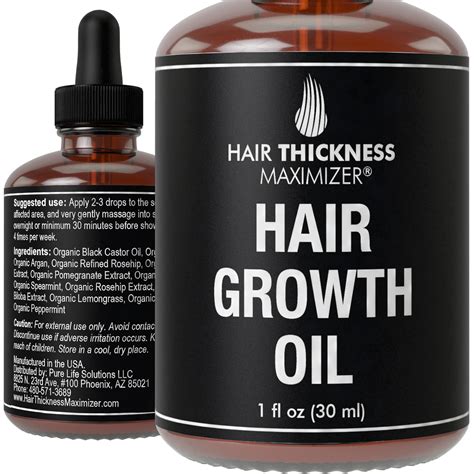What Oil Works Best for Hair Growth?
The quest for luscious, flowing locks has led many to explore the benefits of hair oils. With a multitude of options available, it can be daunting to determine which oil reigns supreme in promoting hair growth. This comprehensive guide will delve into the properties of seven extraordinary oils, empowering you to make an informed choice for your hair care regimen.

1. Argan Oil: The Liquid Gold for Hair
Argan oil, extracted from the kernels of the argan tree native to Morocco, has gained immense popularity for its versatility and effectiveness. Rich in antioxidants and essential fatty acids, argan oil nourishes the scalp, strengthens hair follicles, and combats dryness. Studies have shown that regular use of argan oil can significantly reduce hair breakage, promoting thicker, healthier strands.
2. Coconut Oil: A Tropical Elixir for Strong Hair
Coconut oil, derived from the meat of coconuts, has been used for centuries to promote hair growth in tropical regions. It contains lauric acid, a fatty acid that penetrates deeply into the hair shaft, providing intense hydration and nourishment. Coconut oil also has anti-inflammatory properties, soothing the scalp and reducing dandruff.
3. Rosemary Oil: The Herb that Stimulates Growth
Rosemary oil, obtained from the leaves of the rosemary plant, is a potent hair stimulant. It contains carnosic acid, an antioxidant that promotes blood circulation in the scalp, encouraging hair growth. One study found that rosemary oil applied to the scalp for six months increased hair density by 25%.
4. Castor Oil: The Thickening Powerhouse
Castor oil, extracted from the seeds of the castor bean plant, is renowned for its ability to thicken hair and promote growth. Rich in ricinoleic acid, a fatty acid that nourishes hair follicles, castor oil helps reduce hair loss and breakage. It is also an excellent moisturizer, combating dryness and brittleness.
5. Tea Tree Oil: The Anti-Dandruff Champion
Tea tree oil, extracted from the leaves of the Melaleuca alternifolia tree, has antifungal and antibacterial properties that combat dandruff, a common cause of hair loss. It also soothes the scalp, reducing inflammation and promoting a healthy environment for hair growth.
6. Black Seed Oil: The Immune Booster for Hair
Black seed oil, derived from the seeds of the black cumin plant, is rich in thymoquinone, a compound with anti-inflammatory and antioxidant properties. It strengthens the immune system, protecting the scalp from infections and promoting hair growth. One study found that black seed oil applied to the scalp for eight weeks increased hair count by 30%.
7. Jojoba Oil: The Lightweight Moisturizer
Jojoba oil, extracted from the seeds of the jojoba plant, is a lightweight oil that closely resembles sebum, the natural oil produced by the scalp. It nourishes the hair without weighing it down, balancing moisture levels and reducing dryness. Jojoba oil also has anti-inflammatory properties, soothing the scalp and promoting hair growth.
Which Oil Is Right for You?
The best oil for hair growth depends on your individual hair type and concerns. For dry, damaged hair, argan oil, coconut oil, or castor oil are ideal choices to provide intense hydration and nourishment. For thinning hair, rosemary oil, black seed oil, or tea tree oil can help stimulate growth and reduce breakage. For a lightweight, moisturizing option, jojoba oil is an excellent choice.
Application Methods:
- Scalp massage: Apply a few drops of oil directly to the scalp and massage gently in circular motions to stimulate blood flow and promote absorption.
- Hair mask: Mix a few drops of oil with a carrier oil (such as coconut oil or olive oil) and apply to the hair, covering it with a shower cap for an hour or two before rinsing.
- Leave-in treatment: Add a few drops of oil to a spritz bottle filled with water and use it to mist the hair as a leave-in treatment.
FAQs
- Can hair oils actually promote hair growth? Yes, certain oils contain nutrients and compounds that have been shown to stimulate hair growth, strengthen follicles, and reduce breakage.
- How often should I use hair oils? The frequency of application depends on the oil and your hair type. For most oils, 1-2 times per week is sufficient.
- Can I mix different oils? Yes, you can mix different oils to create a customized blend that addresses multiple hair concerns.
- Can hair oils make my hair greasy? Some oils can be heavy and weigh down hair, but others, such as jojoba oil, are lightweight and non-greasy.
- How long does it take to see results? The time it takes to see results varies depending on the oil used and the individual’s hair growth rate. However, consistency in application is key for optimal results.
- Can I use hair oils on dry or wet hair? Most oils can be applied to either dry or wet hair. However, applying oil to wet hair can help distribute it more evenly.
- Can hair oils damage my hair? When used correctly, hair oils are generally safe and beneficial for hair. However, overuse or using the wrong type of oil can potentially lead to hair damage.
- Can hair oils be used for other hair concerns? Yes, in addition to promoting hair growth, certain oils also have other benefits, such as reducing dandruff, soothing the scalp, and adding shine.
Conclusion
Embarking on the path towards longer, healthier hair can be transformative. By incorporating these seven exceptional oils into your hair care routine, you can harness their potent properties to stimulate hair growth, strengthen follicles, and achieve your hair goals. Remember to choose the oil that best suits your hair type and concerns, and use it consistently to witness the remarkable benefits that nature’s liquid gold has to offer.
